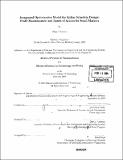Integrated optimization model for airline schedule design : profit maximization and issues of access for small markets
Author(s)
Garcia, Flora A., 1979-
DownloadFull printable version (5.105Mb)
Other Contributors
Massachusetts Institute of Technology. Dept. of Civil and Environmental Engineering.
Advisor
John-Paul Clarke.
Terms of use
Metadata
Show full item recordAbstract
The purpose of the National Airspace System Strategy Simulator is to provide the FAA with a decision support system to evaluate long-term infrastructure and regulatory strategies. The NAS strategy simulator consists of several modules representing the different entities within the NAS embedded in a system dynamics framework. The MIT Airline Scheduling Module is the module within the NAS Strategy Simulator that represents the decision making process of the airlines with respect to the schedules that they fly. The MIT Airline Scheduling Module is an incremental optimization tool to determine schedule changes from one time step to another that best meets demand using available resources. The optimization model combines an Integrated Schedule Design and Fleet Assignment model and a model, based on Passenger Decision Window model, that determines passenger preference for itineraries. We simultaneously establish frequency, departure times, fleet assignment, passenger loads and revenue within a competitive environment. Optimization methods often lead to extreme schedule decisions such as eliminating service to markets, often small markets, that are not financially profitable for the airlines. This is of grave concern to government policy makers as rural access to markets, goods and services is a politically charged subject. The issue is to understand what is likely to happen in small communities if the government doesn't respond in some way and how much subsidy, if any, would it be necessary to encourage airlines to maintain service in these markets. The approach we will use is based on economic policy and cost-benefit analysis.
Description
Thesis (S.M. in Transportation)--Massachusetts Institute of Technology, Dept. of Civil and Environmental Engineering; and, (S.M.)--Massachusetts Institute of Technology, Technology and Policy Program, 2004. Includes bibliographical references (p. 99-100).
Date issued
2004Department
Massachusetts Institute of Technology. Department of Civil and Environmental Engineering; Technology and Policy ProgramPublisher
Massachusetts Institute of Technology
Keywords
Technology and Policy Program., Civil and Environmental Engineering.